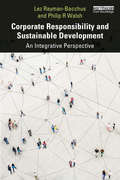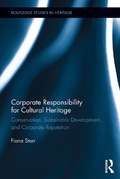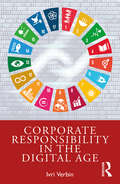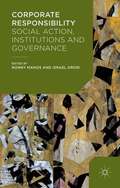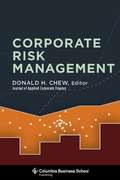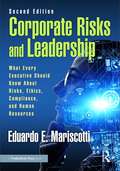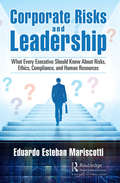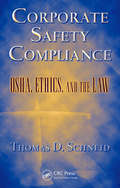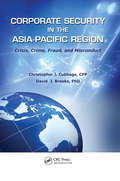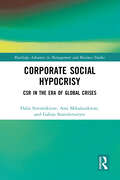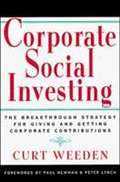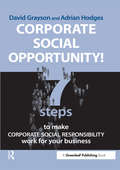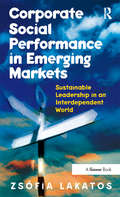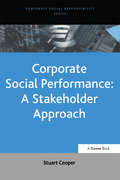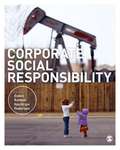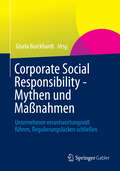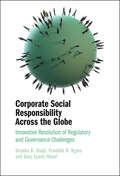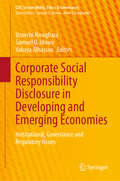- Table View
- List View
Corporate Responsibility and Sustainable Development: An Integrative Perspective
by Lez Rayman-Bacchus Philip R WalshThis book explores the overlapping interests of corporate responsibility and sustainable development, specifically focusing on the dynamics of social change, sustainability governance and evaluation, and creating social value. Corporate Responsibility and Sustainable Development: An Integrative Perspective draws on ideas and research relevant to both concepts, highlighting the interdependent nature of corporate strategy and policymaker ambition. The authors seek to capture that any evaluation of responsibility for sustainable development demands multiple lenses. They propose an integrative understanding to tackling global challenges around sustainable development and focus on four themes: contextualisation; perspectives on social change; sustainability governance and evaluation; and creating social value. Overall, the book takes an evaluative approach, using these themes as lenses for engaging with global challenges, which encourages reflection and informed action. Written by two highly experienced authors, this book integrates short case studies and chapter questions throughout the text, in order to reinforce learning and help readers reconcile ideas presented with real world issues. It will be an essential resource for tutors and advanced undergraduate and postgraduate students of business, governance and corporate governance, corporate social responsibility (CSR), sustainability and sustainable development, stakeholder theory, business ethics, and politics.
Corporate Responsibility for Cultural Heritage: Conservation, Sustainable Development, and Corporate Reputation
by Fiona StarrThis book examines the relationship between two divergent fields – corporate activity and heritage conservation – linking the financing of conservation and its benefits with the corporate social responsibility (CSR) goals of the private sector. Through discussion of physical conservation, benefits to heritage site visitors, sustainable development impacts, and corporate benefits such as improved reputation, this book outlines the shared value of corporate support for cultural heritage sites, and encourages financial and in-kind support for conservation and responsible activity by the private sector. Providing a convincing commercial rationale for CSR managers to engage with cultural heritage sites, this book suggests how companies may reap the benefits of CSR for heritage. Author Fiona Starr offers advice for companies looking to specialize in a unique CSR endeavor, especially those looking to engage with emerging markets. The book also provides useful strategies for heritage managers to attract CSR and financial support, offering new look at the financing of heritage conservation at both international and local levels and providing a new approach to the future of financing of cultural heritage conservation
Corporate Responsibility for Wealth Creation and Human Rights
by Georges EnderleGeorges Enderle proposes a radically new understanding of corporate responsibility in the global and pluralistic context. This book introduces a framework that integrates the ideas of wealth creation and human rights, which is illustrated by multiple corporate examples, and provides a sharp critique of the maximizing shareholder value ideology. By defining the purpose of business enterprises as creating wealth in a comprehensive sense, encompassing natural, economic, human and social capital while respecting human rights, Enderle draws attention to the fundamental importance of public wealth, without which private wealth cannot be created. This framework further identifies the limitations of the market institution and self-regarding motivations by demonstrating that the creation of public wealth requires collective actors and other-regarding motivations. In line with the UN's Guiding Principles on Business and Human Rights, this book provides clear ethical guidance for businesses around the world and a strong voice against human right violations, especially in repressive and authoritarian regimes and populist and discriminatory environments.
Corporate Responsibility in the Digital Age: A Practitioner’s Roadmap for Corporate Responsibility in the Digital Age
by Ivri VerbinThis book is a roadmap to help organizations adopt corporate responsibility and sustainability practices and be fit for purpose in a digital era. It explains why corporate responsibility is the only option in the twenty-first-century post-COVID-19 world, and guides readers through the process of transforming their organizations with continued reference to the importance of technology. This is not a technical manual, and it is not an academic textbook: it is designed to be a quick, easily digested read. The first part looks at the current landscape – both of business and of the world in which it operates. The second part explains why corporate responsibility is the only realistic option for business in the twenty-first-century, post-COVID, and who needs to take responsibility for it. The third part is a step-by-step guide to putting principles into practice, covering: values, stakeholder engagement, employees, supply chain, environment, community, customers and marketing, and reporting and transparency. Each chapter is linked to relevant UN Sustainable Development Goals and supported by dozens of real-world examples. By the end of the book, business leaders will have understood the scope of the challenge involved in leading a truly socially and environmentally responsible organization, and, crucially, will have understood why such a course of action is not only desirable but essential. And they will also have been inspired by a sense of purpose. The book offers direct access to the processes, insights, and techniques for installing corporate responsibility throughout organizations large and small, based on the author’s many years’ experience working in government and with successful large corporations. It is up-to-date and relevant, addressing the implications of COVID-19 and the modern technological “Fourth Industrial Revolution.”
Corporate Responsibility: Social Action, Institutions and Governance
by Israel Drori Ronny ManosThe decision to engage in corporate social action (CSA), and the debates regarding its costs, benefits and implications to corporate performance represent a demanding issue for scholars and managers. Research is inconclusive regarding the causal relations between CSA, corporate social performance (CSP) and corporate financial performance (CFP), despite numerous empirical and theoretical studies devoted to the issue. This book presents an in-depth study of corporate social action and the factors influencing a decision to engage in it. Going beyond the causal relationship between CSA and firm performance, the book stresses the link between CSA and a firm's core managerial policies and practices, reflecting the complexity and varied facets of CSA and the numerous internal and external factors that influence its outcomes. The book draws on the experiences of various industrial sectors to reveal the importance of a range of issues such as top management pay dispersion and ownership structure, which may influence the firm's decision to engage in CSA. It also explores some of the external influences on firms, such as institutional norms, the geopolitical environment and the industrial sector. The first part of the book provides an overview of the thematic issues of CSA and performance. The second part presents a series of empirical studies that examine factors and determinants of CSA. The third part presents case studies to illustrate the processes and outcomes of CSA policy and strategy in environmentally hazardous industries.
Corporate Risk Management: Strategies Management (Columbia Business School Publishing Ser.)
by Ed. Chew Donald H.More than thirty leading scholars and finance practitioners discuss the theory and practice of using enterprise-risk management (ERM) to increase corporate values. ERM is the corporate-wide effort to manage the right-hand side of the balance sheet-a firm's total liability structure-in ways that enable management to make the most of the firm's assets. While typically working to stabilize cash flows, the primary aim of a well-designed risk management program is not to smooth corporate earnings, but to limit the possibility that surprise outcomes can threaten a company's ability to fund its major investments and carry out its strategic plan. Contributors summarize the development and use of risk management products and their practical applications. Case studies involve Merck, British Petroleum, the American airline industry, and United Grain Growers, and the conclusion addresses a variety of topics that include the pricing and use of certain derivative securities, hybrid debt, and catastrophe bonds.Contributors: Tom Aabo (Aarhus School of Business); Albéric Braas and Charles N. Bralver (Oliver, Wyman & Company); Keith C. Brown (University of Texas at Austin); David A. Carter (Oklahoma State University); Christopher L. Culp (University of Chicago); Neil A. Doherty (University of Pennsylvania); John R. S. Fraser (Hyrdo One, Inc.); Kenneth R. French (University of Chicago); Gerald D. Gay (Georgia State University); Jeremy Gold (Jeremy Gold Pensions); Scott E. Harrington (University of South Carolina); J. B. Heaton (Bartlit Beck Herman Palenchar & Scott LLP); Joel Houston (University of Florida); Nick Hudson (Stern Stewart & Co.); Christopher James (University of Florida); A. John Kearney and Judy C. Lewent (Merck & Co., Inc.); Robert C. Merton and Lisa K. Meulbroek (Harvard Business School); Merton H. Miller (University of Chicago); Jouahn Nam (Pace University); Andrea M. P. Neves (CP Risk Management LLC); Brian W. Nocco (Nationwide Insurance); André F. Perold (Harvard Business School); S. Waite Rawls III (Continental Bank); Kenneth J. Risko (Willis Risk Solutions); Angelika Schöchlin (University of St. Gallen); Betty J. Simkins (Oklahoma State University); Donald J. Smith (Boston University); Clifford W. Smith Jr. (University of Rochester); Charles W. Smithson (Continental Bank); René M. Stulz (Ohio State University); D. SAll the articles that comprise this book were first published in the Journal of Applied Corporate Finance. Morgan Stanley's ownership of the journal is a reflection of its commitment to identifying outstanding academic research and promoting its application in the practicing corporate and investment communities.
Corporate Risks and Leadership: What Every Executive Should Know About Risks, Ethics, Compliance, and Human Resources
by Eduardo E. MariscottiThe context of business has been changing for companies in recent years, and following numerous corporate and accounting scandals, many countries have increased the number of national and international regulations designed to ensure transparency and compliance with the law. Because of the existence of these new regulations, the level of control, the severity of sanctions by governments, and the amount of fines for noncompliance have increased dramatically.In parallel, with the technological revolution in communications, business management has become more transparent, and any negative event is uploaded to social networks and shared with an indeterminate number of people. This change in the regulatory, sanctioning, and technological context has forced large companies to rethink risks, investments, and budgets to deal with this more complex environment.To transition to this change, some companies have included ethics and compliance programs in their corporate agenda, along with marketing and sales plans, strategies, growth targets, investment plans, and/or talent acquisition. While each industry has its particular risks, in this book, the author describes the essential elements that any effective ethics and compliance program should contain.This book is a source of information that connects yesterday with today. The author shares observations and lessons of the past to suggest corporate leaders implement effective ethics and compliance programs to protect their organizations and themselves. This book covers theories of ethics but with an eye focused on practical application. Risks, ethics, and compliance are analyzed with an overall vision, connected to the reality of business life, without getting bogged down in abstract thinking or technical and regulatory details.Ethics and compliance are disciplines that have increasingly achieved greater recognition in organizations. Thus, due to the importance of risk management in the business world and the necessary involvement of the CEO and the board of directors, it seems appropriate that executives get access to this book about risks, ethics, compliance, and human resources directed not only to compliance experts but also to any organizational leader.This second edition offers various examples to cultivate ethical thinking and behavior, identify common risks, and comprehend their adverse effects on organizations.
Corporate Risks and Leadership: What Every Executive Should Know About Risks, Ethics, Compliance, and Human Resources
by Eduardo Esteban MariscottiThe context of business has been changing for companies in recent years, and following numerous corporate and accounting scandals, many countries have increased the number of national and international regulations designed to ensure transparency and compliance with the law. Because of the existence of these new regulations, the level of control, the severity of sanctions by governments, and the amount of the fines for noncompliance have increased dramatically. In parallel, with the technological revolution in communications, business management has become more transparent, and any negative event is uploaded to social networks and shared with an indeterminate number of people. This change in the regulatory, sanctioning and technological context has forced large companies to rethink risks, investments and budgets to deal in this more complex environment. To transition to this change, some companies have included ethics and compliance programs in their corporate agenda, along with marketing and sales plans, strategies, growth targets, investment plans and/or talent acquisition. While each industry has its particular risks, in this book, the author describes the essential elements that any effective ethics and compliance program should contain. This book is a source of information that connects yesterday with today. The author shares observations and lessons of the past to suggest corporate leaders implement effective ethics and compliance programs to protect their organizations and themselves. The book covers theories of ethics but with an eye focused on practical application. Risks, ethics, and compliance are analyzed with an overall vision, connected to the reality of business life, without getting bogged down in abstract thinking or in technical and regulatory details. Ethics and compliance are disciplines that have increasingly achieved greater recognition in organizations. Thus, due to the importance of risk management in the business world and the necessary involvement of the CEO and the board of directors, it seems appropriate that executives get access to a book about risks, ethics, compliance and human resources directed not only to compliance experts but also to any organizational leader. This book is a wake-up call that allows business leaders to understand the benefits of implementing an effective ethics and compliance program that will help members of organizations to make the right decisions and act within the law. If they do, they can better prevent and react to the difficult obstacle course of risks, dangers and threats that organizations face and that may jeopardize the sustainability, resilience, and survival of companies.
Corporate Romanticism: Liberalism, Justice, and the Novel (Lit Z)
by Daniel M. StoutCorporate Romanticism offers an alternative history of the connections between modernity, individualism, and the novel. In early nineteenth-century England, two developments—the rise of corporate persons and the expanded scale of industrial action—undermined the basic assumption underpinning both liberalism and the law: that individual human persons can be meaningfully correlated with specific actions and particular effects. Reading works by Godwin, Austen, Hogg, Mary Shelley, and Dickens alongside a wide-ranging set of debates in nineteenth-century law and Romantic politics and aesthetics, Daniel Stout argues that the novel, a literary form long understood as a reflection of individualism’s ideological ascent, in fact registered the fragile fictionality of accountable individuals in a period defined by corporate actors and expansively entangled fields of action.Examining how liberalism, the law, and the novel all wrestled with the moral implications of a highly collectivized and densely packed modernity, Corporate Romanticism reconfigures our sense of the nineteenth century and its novels, arguing that we see in them not simply the apotheosis of laissez-fair individualism but the first chapter of a crucial and distinctly modern problem about how to fit the individualist and humanist terms of justice onto a world in which the most consequential agents are no longer persons.
Corporate Safety Compliance: OSHA, Ethics, and the Law (Occupational Safety & Health Guide Series)
by Thomas D. SchneidSafety and health professionals face a variety of potential legal and ethical issues. As a result of changing responsibilities and new laws, professionals often find themselves in situations without guidance toward the solutions. This book provides such guidance to legal issues involving OSHA and how to avoid potential legal areas of liability if possible. Tackling safety and ethical issues head on, the text explores the area of criminal liability for individuals and corporations under the OSHA Act and state criminal codes. The author also gives methods to achieve and to maintain OSHA compliance, using specific case studies to illustrate ways to avoid or to minimize the impact of legal issues.
Corporate Security in the Asia-Pacific Region: Crisis, Crime, Fraud, and Misconduct
by Christopher J. Cubbage CPP David J. Brooks PhDAs corporations and governments become more litigious and risk averse, international risk management becomes more complex. Corporate Security in the Asia-Pacific Region: Crisis, Crime, Fraud, and Misconduct examines real cases of corporate crisis, crime, fraud, and other misconduct that corporate security professionals need to be aware of to effect
Corporate Social Disclosure
by Carlos NoronhaCorporate Social Disclosure focuses on China and Japan as two countries for critical observations of the latest CSD issues. This volume consists of 12 chapters written by scholars from these two countries, addressing the latest observation of CSD in general as we as in different industries based on their latest research findings.
Corporate Social Entrepreneurship
by Christine A. HemingwayBusiness ethics teaching appears to have had little impact, particularly in the light of continued malpractice and misdemeanour in the form of financial scandals, environmental disasters and adverse consequences for communities. This timely book directly addresses a central question: is it that the existence of an ethical or an unethical climate influences behaviour, or, does the presence or absence of a moral character and personal values have the greatest influence on behaviour at work? Drawing on an empirically derived study and over thirty years of experience in both the public and private sectors, Hemingway proposes four modes of individual moral commitment to corporate social responsibility (CSR) and sustainability: the Active Corporate Social Entrepreneur, the Concealed Corporate Social Entrepreneur, the Conformist and the Disassociated. The discovery of the corporate social entrepreneur offers students and scholars a critical, alternative and optimistic perspective for the future of ethical business.
Corporate Social Hypocrisy: CSR in the Era of Global Crises (Routledge Advances in Management and Business Studies)
by Asta Mikalauskienė Dalia Steimikiene Gabija StanislovaitytėMany new challenges including competitiveness are emerging for sustainable business during this era of disruption. This book analyses these challenges to sustainable development and growth and addresses the impact of corporate social responsibility on the competitiveness of organisations. The authors analyze the major challenges for competitiveness of sustainable business in the COVID-19 era, taking into account a new business environment amid major global risks and uncertainties linked to climate change, pandemics, Russian-Ukrainian war, and intuitions of forthcoming new world economic crisis. The monograph consists of five parts: 1) sustainable development goals and the role of business; 2) climate change, COVID-19, fragile political situation, and business; 3) corporate social responsibility and corporate social hypocrisy; 4) corporate social responsibility, corporate social hypocrisy, and competitiveness of business; and 5) case study on the impact of corporate social responsibility on competitiveness with the impediments of corporate social hypocrisy. The book presents new insights in assessing the impact of CSR on competitiveness of companies with the impediments of corporate social hypocrisy. The developed framework and case study allows to develop valuable policy and managerial implications for sustainable business and engagements in corporate social responsibility as well as to show the danger of corporate social hypocrisy for competitiveness. This book will be of value to researchers, academics, and students in the fields of corporate social responsibility, organizational management, business ethics, and responsible business.
Corporate Social Investing: Breakthrough Strategy for Giving and Getting Corporate Contributions
by Curt WeedenThis is an advanced strategy for giving and getting corporate contributions with various depictions through calculations on the basis of situations from actual economical and statistical world.
Corporate Social Irresponsibility
by Paula AlexanderCorporate Social Irresponsibility focuses on ethical failures in order to relate corporate responsibility to business ethics, corporate governance, and organization effectiveness. The book advocates a strategic approach to CSR – ethical management cannot, and should not, be divorced from effective management. Corporate social responsibility has transitioned from oxymoron into a defining challenge of the twenty first century. Taking the recent financial crisis as a starting point, Alexander examines the underlying ethical and legal crises these events expose in the business world. The problems that have come to light go beyond issues of firm financial performance into the integrity of the manufacturing and marketing processes, and relations with consumers. As such, the book presents a model that resolves the apparent conflict between maximizing shareholder value, and meeting the interests of other firm stakeholders. Alexander presents a balanced view, contrasting her model with alternative approaches. The book also covers the impact of globalization on management, the ethics of outsourcing, the limits of regulation, as well as poverty alleviation and social entrepreneurship. Blending a comprehensive theoretical framework with a broad range of cases, this book covers the latest major changes in US legislation, as well as recent corporate scandals making it a valuable accompaniment to any course in CSR, business ethics, or business, government and society.
Corporate Social Opportunity!: Seven Steps to Make Corporate Social Responsibility Work for your Business
by David Grayson Adrian HodgesThis practical guide is designed to help business leaders and their managers understand how to assess the impact of corporate social responsibility factors on their core business strategy and operations, and help them identify and prioritize between subsequent options and resulting business opportunities
Corporate Social Performance in Emerging Markets: Sustainable Leadership in an Interdependent World
by Zsófia LakatosWhen it comes to perceptions of what is a sustainable economy and how it may be realised, companies expanding into Central and Eastern European markets face the challenge of diverse people, attitudes and history. Corporate Social Performance in Emerging Markets provides an effective tool for companies to help them engage in CSR activities and become a responsible company in CEE countries such as Poland, Hungary, the Czech Republic, Slovakia, Croatia and Slovenia. It does this by enabling them to focus on the difference of stakeholders and their attitudes to those of Western Europe. The author, Zsófia Lakatos, provides a review of the major differences between the various CEE countries, supported by interview research from leading executives in some of the blue-chip companies already operating in the region.
Corporate Social Performance: A Stakeholder Approach (Corporate Social Responsibility Series)
by Stuart CooperCorporate social performance has come of age. In a business environment characterized by its perpetual state of flux, the ability to recognize and react to global forces becomes paramount. The fallout of such rapid change - the fast-paced developments in communications and technology, the continual change to global markets, shifting demographics, the homogenization of personal values - have all contributed to the widespread new interest in issues such as ecology and environment, human rights and diversity, health and well-being, and communities. All of these issues are now potential liabilities for companies, and are very much back on the agenda for business. Once regarded as peripheral management concerns, they are now recognized as hard to predict and hard for business to deal with when they go wrong. This book offers an insight into how corporate social performance can be measured and why this is an important aspect of corporate social responsibility. Using detailed case studies, it provides readers with the foundations for understanding and applying corporate social performance, providing a stakeholder framework by which corporate social performance can be measured, alongside a detailed consideration of the value of different stakeholder measures. The book also applies this framework to new social accounting standards, enabling the reader to consider the validity and appropriateness of these standards. The increasingly important role of the internet for corporate social reporting is also considered.
Corporate Social Responsibility
by Mette Morsing Andreas Rasche Jeremy MoonAlthough the idea of social responsibility has a long and distinguished intellectual pedigree, Corporate Social Responsibility (or 'CSR') has re-emerged during the last fifteen years or so as a high-profile concept in both academia and business practice. This revitalized interest has come about largely because of the development of the 'markets for virtue' that have institutionalized CSR in business practices in an unprecedented manner. CSR has achieved organizational distinctiveness within companies (e. g. in managerial and board responsibilities); social and environmental reporting requirements have dramatically increased; socially responsible investment funds have not only established themselves in their own right, but have also informed more mainstream investment criteria, particularly regarding social and environmental risk; a CSR consultancy industry has emerged, along with various 'vanguard groups' and NGOs who seek not only to promote CSR, but also to bring critical perspectives to bear and to raise CSR standards; and governments around the globe have encouraged investment in CSR, better reporting of these activities, and the implementation of CSR initiatives that complement broader public policies. As research in and around CSR blossoms as never before, this new four-volume collection from Routledge's acclaimed Critical Perspectives on Business and Management series meets the need for an authoritative reference work to make sense of a rapidly growing and ever more complex corpus of literature. Edited by two scholars from Nottingham University's world-class International Centre for Corporate Social Responsibility, the collection gathers foundational and canonical work, together with innovative and cutting-edge applications and interventions. With a full index, together with a comprehensive introduction, newly written by the editors, which places the collected material in its historical and intellectual context, Corporate Social Responsibility is an essential work of reference. The collection will be particularly useful as an essential database allowing scattered and often fugitive material to be easily located. It will also be welcomed as a crucial tool permitting rapid access to less familiar--and sometimes overlooked--texts. For researchers, students, practitioners, and policy-makers, it is as a vital one-stop research and pedagogic resource.
Corporate Social Responsibility
by Esben Rahbek Pedersen*Shortlisted in the Management and Leadership Textbook Category at CMI Management Book of the Year Awards 2016* Instructors - Electronic inspection copies are available or contact your local sales representative for an inspection copy of the print version. Why has CSR become part of the mainstream business and academic agenda in the 21st century? How can CSR be fully integrated in business strategy and day-to-day operations? Do companies become more vulnerable to criticism from stakeholders if they make public their commitment to CSR? These are just some of the questions and challenges explored in this exciting new textbook. Readers will not only gain comprehensive knowledge and understanding of the history of CSR, the key CSR drivers, the main theoretical CSR perspectives and the dominant CSR practices found in the business community, they will also, more crucially, learn how to implement CSR in practice. Written and edited by leading academics in the field, Corporate Social Responsibility is an engaging and accessible text designed for any student seeking an introduction to this complex and ambiguous subject. Esben Pedersen is Professor at the CBS Center for Corporate Social Responsibility, Copenhagen Business School. Visit the Companion Website at (https://study.sagepub.com/pedersen) for annotated web links, free full-text journal articles and more.
Corporate Social Responsibility
by Esben Rahbek PedersenWhy has CSR become part of the mainstream business and academic agenda in the 21st century? How can CSR be fully integrated in business strategy and day-to-day operations? Do companies become more vulnerable to criticism from stakeholders if they make public their commitment to CSR? These are just some of the questions and challenges explored in this exciting new textbook. Readers will not only gain comprehensive knowledge and understanding of the history of CSR, the key CSR drivers, the main theoretical CSR perspectives and the dominant CSR practices found in the business community, they will also, more crucially, learn how to implement CSR in practice. Written and edited by leading academics in the field, Corporate Social Responsibility is an engaging and accessible text designed for any student seeking an introduction to this complex and ambiguous subject. Esben Pedersen is Professor at the CBS Center for Corporate Social Responsibility, Copenhagen Business School. Visit https://study.sagepub.com/pedersen for annotated web links, free full-text journal articles and more.
Corporate Social Responsibility - Mythen und Maßnahmen: Unternehmen verantwortungsvoll führen, Regulierungslücken schließen
by Gisela BurckhardtIn Zeiten der Globalisierung und Massenproduktion rückt verantwortungsvolle Unternehmensführung immer mehr in das Bewusstsein der Unternehmen. Damit Corporate Social Responsibility in Organisationen nicht als reine PR-Maßnahme angesehen wird, braucht es jedoch zunächst ein tiefes Verständnis, was sich hinter dem Begriff eigentlich verbirgt. Dieses Buch zeigt die Bandbreite von Unternehmensverantwortung zwischen Freiwilligkeit und Regulierung in globalen Lieferketten auf. Es stellt Maßnahmen und Initiativen von Unternehmen vor und gibt konkrete Empfehlungen, wie sinnvolle und nachhaltige CSR-Maßnahmen in Organisationen umgesetzt werden können.
Corporate Social Responsibility Across the Globe: Innovative Resolution of Regulatory and Governance Challenges
by Franklin N. Ngwu Onyeka K. Osuji Gary Lynch-WoodCorporate Social Responsibility Across the Globe demonstrates many ways that CSR can be applied by law to overcome regulation and governance challenges around the world. Using interdisciplinary and comparative models and perspectives, the book challenges dominant understandings of CSR, such as neoliberal voluntarism, and demonstrates the regulatory and governance implications of an interdependent relationship between CSR and the law. The book identifies substantive and procedural barriers for CSR in national, public, and private international law. By analyzing, deconstructing, and reframing CSR in these contexts, the book underlines opportunities for more effective application of CSR as a governance mechanism. Chapters investigate relevant regulation concepts, paradigms and approaches for CSR; methods for infusing CSR in corporate governance; and ways to facilitate private regulation of CSR in more developed, emerging, and developing jurisdictions.
Corporate Social Responsibility Disclosure in Developing and Emerging Economies: Institutional, Governance and Regulatory Issues (CSR, Sustainability, Ethics & Governance)
by Samuel O. Idowu Uzoechi Nwagbara Yahaya AlhassanThis book offers a new, nuanced, and comprehensive look at how CSR is practiced and disclosed in terms of corporate transparency, sustainability, and accountability, from the perspective of developing and emerging economies. Given the importance and power of emerging economies in shaping global gross domestic product (GDP), entrepreneurship, and corporate investment, it is crucial to examine this phenomenon in terms of corporate sustainability and achieving the ideals of the Sustainable Development Goals (SDGs) for a more sustainable future. The book therefore addresses contextual institutional, regulatory, and governance issues in these regions to contribute to the debate as well as a rethinking of the motivation for CSR practice and reporting. The book will be of interest to researchers, practitioners, and students.
